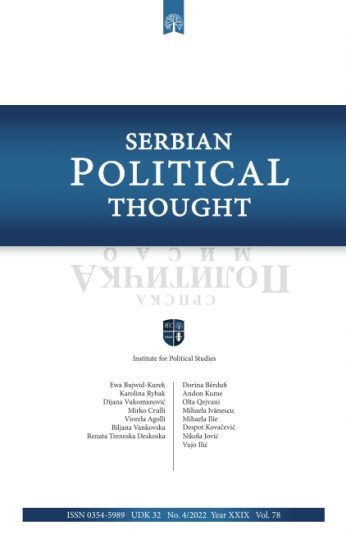Main topic
SERBIA: POLITICAL-LEGAL, CULTURAL AND IDENTITY PROCESSES
POSITION OF THE BULGARIAN NATIONAL MINORITY AND SERBIA’S ACCESSION TO THE EUROPEAN UNION
Abstract
Based on the analysis of census statistical data, the paper studies the development, position, socio-economic and ethno-demographic characteristics of members of the Bulgarian national minority in Serbia. Following and comparing the results of successive state censuses, depopulation trends in the demographic development of Bulgarian nationality were observed, whose number has decreased by more than three times since World War II, as a result of decades of declining fertility, aging, migration, ethnic alternation, and other factors. In addition to the number and spatial distribution, the paper also investigates the characteristics of the age, educational, and economic structure, as important indicators of the position and socio-cultural development of the Bulgarian population in Serbia. The analysis of census results on the mother tongue as an important ethnocultural feature for the realization of certain minority rights in various spheres of social life is also important. The second part of the paper deals with the legal and political position of the Bulgarian minority through the prism of Serbian-Bulgarian relations, bearing in mind the impact of regulating the status and respecting minority rights on regional cooperation and bilateral agreements between Serbia and Bulgaria. At the same time, it is an important condition for Serbia’s European integration and EU accession, which implies that improving the position of national minorities and good relations with neighbors, especially those whose members live as national minorities in Serbia, is a priority of Serbia’s foreign policy. Research conducted over the last decade indicates that the degree and forms of guaranteed human and minority rights of the Bulgarian national minority in Serbia are well established, with possible further improvement of mechanisms for their realization.
References
- Bugarski, Ranko. 2016. „Jezik, multikulturalizam i interkulturalizam.ˮ U Stanje i perspektive
- multikulturalizma u Srbiji i državama regiona, ur. Vojislav Stanovčić i Goran Bašić, 111‒118. Beograd: Srpska akademija nauka i umetnosti i Institut društvenih nauka.
- Đurić, Vladimir, Darko Tanasković, Dragan Vukmirović, i Petar Lađević. 2014. Etnokonfesionalni i jezički mozaik Srbije. Beograd: Republički zavod za statistiku.
- Forum za etničke odnose. 2018. Izazovi manjinske politike u bilateralnoj i regionalnoj saradnji. Beograd: FEO.
- Forum za etničke odnose. 2017. Nacionalne manjine u odnosima Srbije sa susedima. Beograd: FEO.
- Gateva, Eli. 2015. European Union Enlargment Conditionality London: Palgrave MacMillan.
- Haug, Werner, Courbage Youssef, and Paul Compton. 1998. “The demographics of national minorities in certain European states.ˮ Population Studies, Nо. 30/1998. Strasbourg: Council of Europe Publishing.
- Ivanova, Cenka. 2007. „Status bugarskog jezika u Srbiji sa sociolingvističkog i lingvo-
- kulturološkog aspekta.”U Položaj nacionalnih manjina u Srbiji, ur. Vojislav Stanovčić,
- 571‒579. Beograd: SANU, Odeljenje društvenih nauka.
- Igrutinović, Milan. 2017. Srbija i Bugarska – Bilateralni odnosi i otvorena pitanja između Srbije
- i Bugarske u kontekstu pristupanja Srbije EU. Beograd: Centar za primenjene evropske studije – CPES.
- ISAC fond – Centar za međunarodne i bezbednosne poslove [ISAC]. 2013. Bugari u Srbiji i
- srpsko-bugarski odnosi u svetlu evropskih integracija Srbije. Beograd: ISAC fond i Friedrich Ebert Fondacija.
- Janjić, Dušan. 1996. „Sociološko-politikološki aspekti manjinske politike i zaštite manjina u SR
- Jugoslaviji.ˮ. U Položaj manjina u Saveznoj Republici Jugoslaviji, ur. Miloš Macura i Vojislav Stanovčić. Beograd: SANU, Odelјenje društvenih nauka.
- Miladinović, Zorica. 2010. „Beg od svog identiteta ili Bugari u Srbiji.” Danas. Poslednji pristup 27.08.2010. https://www.danas.rs/nedelja/beg-od-svog-identiteta-ili-bugari-u-srbiji.
- Ministarstvo prosvete, nauke i tehnološkog razvoja RS [MPNITR]. www.openda-ta.mpn.gov rs.
- Minority News. 2018. „Bugarska počela prvo predsedav EU.” Minority News, br. 42.
- www.minoritynews.rs, str. 3.
- Minority News. 2018а. „U Evropskoj uniji nema malih I velikih.” Minority News, br. 42.
- www.minoritynews.rs, str. 4‒6.
- Minority News. 2019. „Proširenje Evropske Unije ostaje prioritet Bugarske.” Minority News,53. www.minoritynews.rs, str. 5‒7.
- Novaković, Igor, Žarko Petrović i Tijana Jakišić. 2013. „Odnosi Srbije i Bugarske, položaj
- bugarske manjine u Srbiji i proces evropskih integracija.” ISAC Policy Perspective. www.isac-fond.org.
- Organizacija za evropsku bezbednost i saradnju [OEBS]. 2012. Ljubljanske smernice za
- integraciju raznolikih društava.Visoki komesar za nacionalne manjine. Hag : OEBS..
- Papkočev. Georgi. 2012. „Bugarska manjina na putu Srbije ka EU.”. Politika. Poslednji pristup 20. 04. 2012. https://www.dw.com/sr/bugarska-manjina-na-putu-srbije-ka-eu/a-15899881.
- Pavlica. Branko, 1996. „Bugarska nacionalna manjina u Jugoslaviji.” U Položaj manjina u
- Saveznoj Republici Jugoslaviji, ur. Miloš Macura i Vojislav Stanovčić, 709‒722. Beograd: SANU, Odeljenje društvenih nauka.
- Raduški. Nada, 2007. Nacionalne manjine u Centralnoj Srbiji – etničke promene i demografski
- Razvoj. Beograd: Institut društvenih nauka.
- Raduški. Nada, 2011. „Demografske komponente nacionalnog identiteta.ˮ Srpska politička Misao. 31 (1): 321‒336.
- Republički zavod za statistiku [RZS]. 2012. Popis stanovništva, domaćinstava i stanova 2011.godini u Republici Srbiji – Nacionalna pripadnost, podaci po opštinama i gradovima.ˮ. Knjiga 1. Beograd: Republički Zavod za Statistiku.
- Republički zavod za statistiku [RZS]. 2013. Popis stanovništva, domaćinstava i stanova u 2011.
- godini u Republici Srbiji, Veroispovest, maternji jezik i nacionalna pripadnost. Knjiga 4, Beograd: Republički Zavod za Statistiku.
- Zakon o ratifikaciji Evropske povelje o regionalnim ili manjinskim jezicima [ZOREPORIMJ],
- „Službeni list Srbije i Crne Gore – Međunarodni ugovoriˮ, br. 18/2005.
- Zakon o zaštiti prava i sloboda nacionalnih manjina [ZOZPISNM], 2002. „Službeni list Savezne Republike Jugoslavijeˮ, br. 11/2002.
- Zakon o nacionalnim savetima nacionalnih manjina [ZONSNM], 2018. „Službeni glasnik Republike Srbijeˮ, br.72/2009, 20/14 – US, 55/14 i 47/2018.
- Zakon o službenoj upotrebi jezika i pisma [ZOSUJIP], 2018. „Službeni glasnik Republike Srbijeˮ, br. 45/1991, 53 i 67/1993, 48/1994, 101/2005, 30/2010 i 47/2018.


